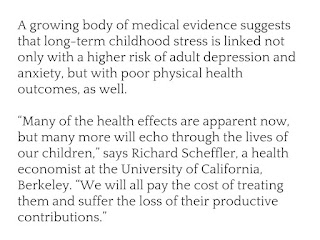An interesting article in a recent New York Times Sunday review caught my eye. Vicki Abeles used an eye catching headline "Is the Drive for Success Making Our Children Sick?" to grab my attention. I have linked the article here. The case presented amazed and shocked me that we, as a society, could allow this to occur. She cites a study by Stuart Slavin, a paediatrician and professor at the Saint Louis University School of Medicine that uses data gathered from a Californian school. The study found that "54 percent of students showed moderate to severe symptoms of depression. More alarming, 80 percent suffered moderate to severe symptoms of anxiety." The really alarming comment made by Slavin, is that this value could be underestimated and that if this one school provides a realistic view of the nation, then real mental health problems will exist in the future.
It really seems that the problems is getting larger and the problems are now starting to surface earlier. Parents see the push to have a tick box list of activities and actions that need to be completed to get their child into the "best university or college". Students are under constant pressure from homework, service and co-curricula activities and all these other commitments that are part of their daily lives. Sleep deprivation and anxiety seem a natural part of their day instead of the rare occurrence due to a bout of procrastination. The statement by Lawrence Rosen that the push is now in early elementary is a real indictment of the levels to which our society has sunk. The cornerstone of most early childhood education principles and programs world-wide is "play based learning". I wonder how we can even try to justify the lip service that appears to be given this considering the endless hours of tutoring and coaching children go through? Many of the children I see, have their days fully planned out for them from an early age. It has also made it seem almost mandatory to adopt the tutor-based culture that is so rampant in certain cultures. I have even heard parents comment about whether they should enrol their children in tutor programs because all other children in the class were engaged in them and they didn't want to be the only ones not doing it! The voice of the herd over the voice of common sense. Tutoring was once the province of remediation and now it appears to be the province of fashion or fad. Where once it was hidden, now it is proudly announced to the world.
Its quite amazing when you consider the response of some European countries to this trend. Children start school and learn by play, it is not until the child is ready that formal education actually begins. Yet we have children as young as 3-4 spending time at tutoring getting themselves ready to be able to tick the box. At some kindergartens in Hong Kong, academics studies have already taken over! A great pity considering that we are robbing the students of their childhood. The Hong Kong Early Childhood Documents though fully advocate a play based program, but it appears that societal expectations have overridden the document and the will of educators.
This is surely the domain of the parents, to ensure that our young children are not exposed to levels of anxiety. However, in their defence they are only "playing the game" that is begun and perpetuated by out tertiary institutions - but I must say that I find that a pretty feeble defence when you think of your own child's well-being. It is a given that the college process must be changed, but parents must take their share of the responsibility as well. They wonder why their child is experiencing anxiety attacks and behaving differently, wanting to attack or treat the symptoms rather than look for the cause.
While I acknowledge the studies that were done in America, but in all honesty would they be too different if conducted here in Hong Kong or for that matter in any other developed society. I know that the parental expectations here are high and the push towards (perceived) success are also present, so it could easily be a global issue. The side-effect of this whole process is the increased medication of our youth and pre-teens. Is that really the legacy we want to leave?








